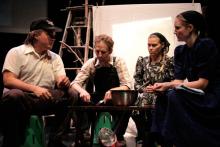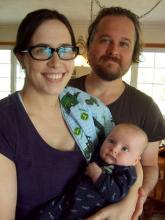The theatre was dim. A projection screen showed an animated scene of a farm yard by night. The wind rippled through the trees and grass. Clouds blew across the moon. Crickets chirped in the background as the low voices of the patrons sounded like the voices of farm dwellers on the porch in the cooling evening after a hot day on the fields. A single actor walked onto the stage, picked up his guitar and sang, “I’m a hard worker, you should see me hoe tomatoes, I’m faster than fast. Oh the other boys faces when the last plant in my row falls to the dust, they’re still in their starting places” (Leamington—music and words by Henry Adam Svec). Other actors and musicians join him on stage, hoeing, hammering and working rhythmically.
Erin Brandenburg is becoming known for writing plays about empty places, unknown places, places with Mennonite connections, but written for people whose only knowledge of Mennonites is of horses, buggies and head coverings. As part of Kitchenband, a collective of theatre creators, writers, musicians, actors, visual artists and designers based in Toronto, she and her compatriots aim to tell stories of the Canadian landscape and history that blur the lines between theatre, live music and visual art. In a “culture obsessed with ‘of the moment’ and ‘shiny’ she tells stories about forgotten places, lost things.”
“Canadian history is seen as boring,” she says, “but there are so many amazing stories out there—talk to your neighbour.” Her stories are about her background and family, including those of her husband, Andrew Penner, an actor and front man for Sunparlour Players, an alt country band currently touring across Canada. “The ruins of a place have a lot to tell you,” she says.
Her latest offering, Petrichor, played at in the Factory Theatre at Toronto’s Summer Works Festival August 10 - 19. The word “petrichor” is a technical term created by two researchers for the smell of certain plant and bacterial compounds released by rain newly fallen on dry ground.
The story delves into Brandenburg’s background of working and living in and around Harrow Ontario, near Windsor. There she encountered Mennonites from Mexico, both in school—“They were often the smartest in the class”—and on the farms, hoeing tomatoes and doing other manual labour. She also encountered the bigotry against the “Mexican Mennonites” and felt the need to hide her own Mennonite connections at Harrow Mennonite Church for fear of being lumped in with the others.
Petrichor follows Henry, a Canadian boy, the son of the farm owner, and Susan, a Mennonite from Mexico with some kind of secret which keeps her in bondage. The farm is suffering a summer of drought, paralleling the conditions in Southern Ontario this summer. Somehow Susan’s conservative, Old Colony Mennonite upbringing and church, here portrayed as misogynist and binding, no longer sustain her in life. She and her brother are living and working with their sister Mary and her husband Dick. Along the way the “Mennonite Mafia” appear—transporting marijuana from Mexico to Canada. But it is not only Susan who is asking questions about life and not fitting in—Henry doesn’t want to farm, he’d rather sing. Played by Henry Adam Svec, it was songs written by Svec that moved Brandenburg to write the play in the first place, songs of work and of longing. Inspired especially by the song “Leamington,” she interviewed farmers and workers in the Leamington area before writing.
While she hopes Petrichor will play in Mennonite communities, she wonders what response it will have “back home” in Leamington. Its “labour issues, questions about where our food comes from are more universal issues. Some farmers treat their workers well, others . . .” she let’s the question hang and muses, “How to ask those questions of a community with all the economic and political entanglements.” When “people don’t want questions,” it “makes her more interested.” She asks, “Aren’t we to love each other, be concerned about justice issues, other places and our backyard . . .” The play purposely has no answers, attempting to “open the discussion.”
Brandenburg has been acting since her days in high school at United Mennonite Educational Institute, and professionally in a troupe in Windsor from the same time. Her play Reesor played in Toronto a few years ago, also produced by Kitchenband. The collective “are all there from the beginning, designers, instrument makers, animation, writers, musicians,” a process that satisfies Brandenburg.
Brandenburg is already busy workshopping Boblo, a play about an abandoned amusement park that will play at The Theatre Centre in Toronto in November this year.




Add new comment
Canadian Mennonite invites comments and encourages constructive discussion about our content. Actual full names (first and last) are required. Comments are moderated and may be edited. They will not appear online until approved and will be posted during business hours. Some comments may be reproduced in print.